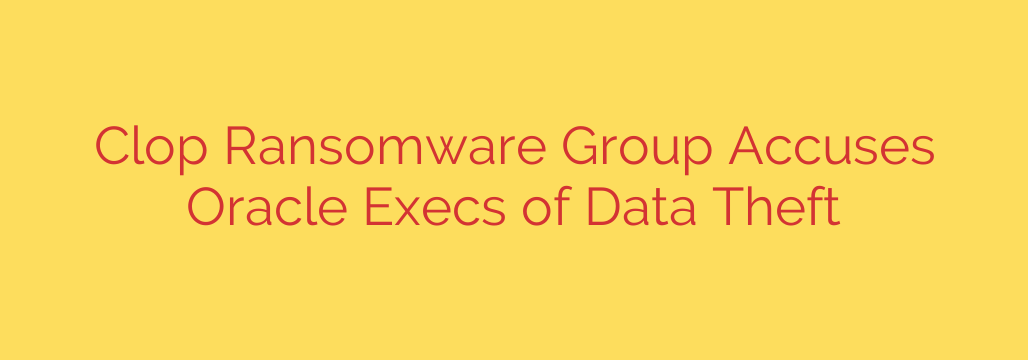
Clop Ransomware Accuses Oracle of Corporate Espionage in Unprecedented Move
In a stunning and bizarre development shaking the cybersecurity world, the notorious Clop ransomware group has publicly accused executives at tech giant Oracle of downloading data stolen from other companies. This unprecedented move marks a dramatic shift in tactics for a cybercriminal organization, turning the tables to accuse a major corporation of unethical data handling.
The accusation, posted on Clop’s dark web leak site, alleges that individuals using Oracle-owned IP addresses accessed and downloaded sensitive information. It’s crucial to understand that this was not Oracle’s own data. Instead, the information in question was stolen from other victims of Clop’s massive hacking campaign that exploited a critical vulnerability in the MOVEit Transfer file-sharing software.
This campaign has already impacted hundreds of organizations worldwide, including major financial institutions like Hatch Bank and Fiserv, whose data was allegedly accessed by the Oracle-affiliated IPs.
The Explosive Allegations: What Clop Claims
According to the ransomware group, their website logs show multiple connections from IP addresses belonging to Oracle. Clop claims that individuals from the tech giant downloaded gigabytes of data stolen from various other companies. By “naming and shaming” Oracle, Clop is essentially accusing the company of corporate espionage or, at the very least, highly unethical intelligence gathering.
The group posted a list of the IP addresses as “proof” of their claims. However, it’s important to note that these claims are currently unverified. IP addresses can be masked using VPNs or other anonymizing services, making definitive attribution a complex task without further investigation.
A New Tactic in Cyber Warfare?
This move by Clop is highly unusual and represents a potential new front in the psychological warfare waged by cybercriminals. Typically, ransomware gangs focus on extorting their direct victims. By publicly accusing a non-victim corporation of snooping, Clop may be attempting to achieve several goals:
- Sow Distrust: The accusation creates chaos and suspicion among corporations, potentially damaging Oracle’s reputation and relationships with partners whose data was involved.
- Generate Publicity: This novel tactic guarantees headlines and keeps the Clop brand in the spotlight, demonstrating their audacity and reach.
- Deter Corporate Monitoring: It may serve as a warning to other corporate security and threat intelligence teams who monitor ransomware leak sites.
This incident shines a light on the murky world of corporate threat intelligence. It is standard practice for security teams to monitor dark web sites to identify potential threats, check for their own company’s data, and understand the tactics of threat actors. However, there is a fine line between legitimate threat research and downloading sensitive data belonging to competitors or partners.
Key Takeaways and Security Best Practices for Your Business
While the full story behind Clop’s accusations against Oracle is still unfolding, this event offers critical lessons for every organization.
The Threat Landscape is Constantly Evolving: Cybercriminals are becoming more creative and unpredictable. Their motivations are expanding beyond simple financial extortion to include public shaming, market manipulation, and psychological warfare. Businesses must remain agile and prepared for unconventional threats.
Establish Clear Policies on Threat Intelligence: If your security team monitors threat actor activity, you must have a clearly defined and legally vetted policy. This policy should outline what is permissible, particularly regarding the handling of sensitive data discovered on leak sites that belongs to other entities. Define the ethical and legal boundaries for your team before an incident occurs.
Focus on Proactive Defense: The entire Clop campaign was made possible by a single vulnerability in the MOVEit Transfer software. This serves as a powerful reminder of the importance of fundamental security hygiene. Patching vulnerabilities promptly, maintaining a comprehensive asset inventory, and implementing a defense-in-depth strategy remain the most effective ways to protect your organization from becoming a victim in the first place.
This strange saga highlights the increasingly complex and intertwined nature of corporate security and cybercrime. Whether Clop’s claims are true or merely a malicious fabrication, the accusation alone has created a significant reputational challenge for Oracle and serves as a stark warning to the entire corporate world.
Source: https://go.theregister.com/feed/www.theregister.com/2025/10/02/clop_oracle_extortion/








